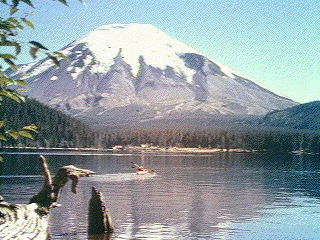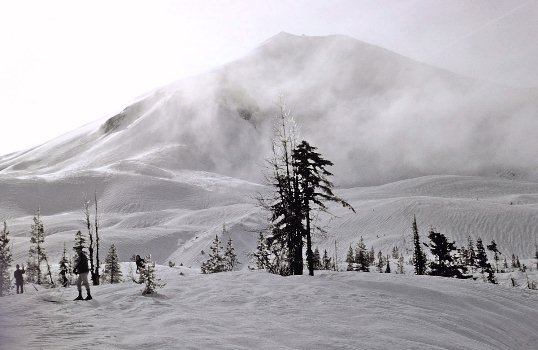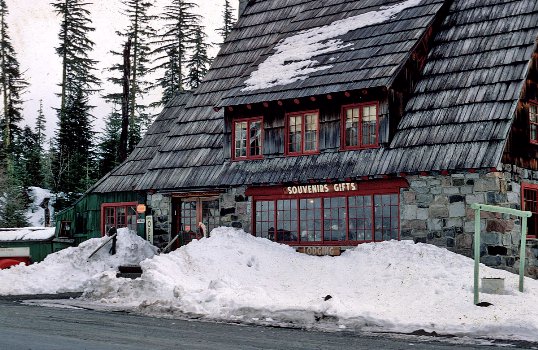Loo-Wit
by Wendy Rose The way they do
this old woman
no longer cares
what we think
but spits
her black tobacco
any which way
stretching
full length
From her bumpy bed.
Finally up
she sprinkles
ash on the snow,
cold buttes
promise nothing
but the walk
of winter.
Centuries of cedar
have bound her
to earth,
huckleberry ropes
lay prickly
on her neck.
Around her
machinery growls,
snarls and ploughs
great patches of her skin.
She crouches
in the north,
her trembling
the source
of dawn.
Light appears
with the shudder
of her slopes,
the movement
of her arm.
Blackberries unravel,
stones dislodge;
it's not as if
they were not warned.
She was sleeping
but she heard the boot scrape,
the creaking floor,
felt the pull of the blanket
from her shoulder.
With one hand free
she finds her weapons
and raises them high;
clearing the twigs from her throat
she sings, she sings, shaking the sky
like a blanket about her
Loo-wit sings and sings and sings!
|
Keeper
of the Fire
Long ago, when the world was young, all people were happy, The Great
Spirit,
whose home is in the sun, gave them all they needed. No one was Hungry, no one
was cold.
But after a while, two brothers quarreled over the land. The elder one wanted
most of it,
and the younger one wanted most of it. The Great Spirit decided to stop the
quarrel.
One night while the brothers were asleep he took them to a new land, to a country with
high
mountains. Between the mountains flowed a big river.
The Great Spirit took the two brothers to the top of the high mountains and wakened them.
They saw that the new country was rich and beautiful.
"Each of you will shoot a arrow in opposite directions," he said to them.
"Then you will follow your
arrow. Where your arrow falls, that will be your country. There you will become a great
chief.
The river will separate your lands."
One brother shot his arrow south into the valley of the Willamette River. He became the
father
and the high chief of the Multnomah people. The other brother shot his arrow north into
the Klickitat country. He became the father and high chief of the Klickitat
people.
Then the Great Spirit built a bridge over the big river. To each brother he said, "I
have built
a bridge over the river, so that you and your people may visit those on the other side.
It will be a sign of peace between you. As long as you and your people are good and are
friendly
with each other, this bridge of the Tahmahnawis will remain.
It was a broad bridge, wide enough for many people and many ponies to walk across at one
time.
For many snows the people were at peace and crossed the river for friendly visits.
But after a time they did wicked things. They were selfish and greedy, and they quarreled.
The Great Spirit, displeased again, punished them by keeping the sun from shining.
The people had no fire, and then the winter rains came, they were very cold.
Then they began to be sorry for what they had done, and they begged the Great Spirit for
fire.
"Give us fire, or we will die from the cold," they prayed. The heart of the
Great Spirit
was softened by their prayer. He went to an old woman who had kept herself from the
wrongdoing
of her people and so still had some fire in their lodge.
"If you will share your fire, I will Grant you anything you wish," the Great
Spirit promised her.
"What do you want most?"
"Youth and beauty," answered the old woman promptly, "I wish to be young
again, and to be beautiful."
"You shall be young and beautiful tomorrow morning," promised the Great Spirit.
"Take you fire to the bridge, so that the people on both sides of the river can get
it easily.
Keep it burning there always as a reminder of the goodness and kindness of the Great
Spirit."
The old woman, whose name was Loo-wit, did as he said. Then
the Great Spirit commanded
the sun to shine again. When it rose the next morning, it was surprised to see a young
and beautiful maiden sitting beside a fire on the Bridge of the Gods. The people, too,
saw the fire, and soon their lodges were warm again. For many moons all was peaceful on
both sides of the great river and the bridge.
The young men also saw the fire--and the beautiful young woman who attended it.
They visited her often. Loo-wit's heart was
stirred by two of them--a handsome young
chief from south of the river, whose name was Wyeast, and a handsome young chief from
north of the river, whose name was Klickitat. She could not decide which of
the two she liked better.
Wyeast and Klickitat grew jealous of each other and soon began to quarrel. They became
so angry that they fought. Their people also took up the quarrel, so that there was much
fighting on both sides of the river. Many warriors were killed.
This time the Great Spirit was made angry by the wickedness of the people. He broke down
the Bridge of the Gods, the sign of peace between the two tribes, and its rocks fell into
the river.
He changed the two chiefs into mountains. Some say that they continued to quarrel over
Loo-wit
even after they were mountain peaks. They caused sheets of flame to burst forth,
and they hurled hot rocks at each other. Not thrown far enough, many fell into the river
and blocked it. That is why the Columbia is very narrow and the water very swift at the
Dalles.
Loo-wit was changed into a snow-capped peak which still has
the youth and beauty promised by
the Great Spirit. She is now called Mount St. Helens. Wyeast
is known as Mount Hood, and
Klickitat as Mount Adams. The rocks and white water where the Bridge of the Gods fell are
known as the Cascades of the Columbia.
-------Clark,Ella (1953) Indians of the Pacific Northwest (renewed
1981). The Regents of the University of California
-This version of the legend is based on a summary which Mrs.
Lulu Crandall prepared for a
pageant performed at The Dalles, Oregon, in 1923, Mrs. Crandall, a pioneer teacher and
local historian,
had known the Indians of her area since childhood. |


![]()

![]()


![]()
![]()